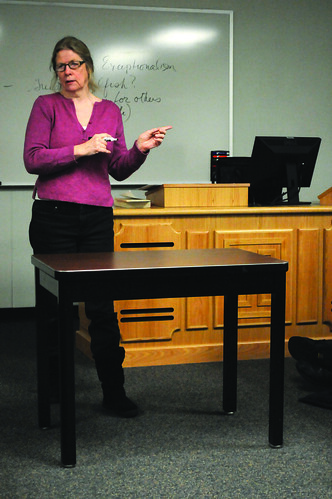Administrators and adjunct instructors discuss how stable the job should be.

In December, 45 adjunct instructors from the English department’s First-Year Writing Program were told they would not be assigned courses come Spring 2011. But the English department isn’t the only area of the university in which adjunct instructors are out of work.
Adjunct instructor Carol Jenkins, of the department of political science, said a number of adjunct instructors weren’t assigned classes in her department.
Jenkins said Richard Deeg, the chair of the department of political science, told her it was because of a change in the policy, informally known as the “gradjunct” policy. But Deeg said the policy is expected to change next year.
“The situation at Temple overall is bad,” Jenkins said. “It seems like it sometimes goes from department to department, depending on how many graduate students there are.”
Likewise, English instructor Eli Goldblatt, who informed the English department adjunct instructors of their “layoffs,” previously told The Temple News class assignments in the writing program were influenced by a change in a university policy.
The policy change allows graduate students who are working to complete their dissertations to continue to teach, under the title graduate teaching assistants.
This decision was made in accordance with the Temple University Graduate Students’ Association’s collective bargaining agreement and with the university’s overall plan to help students graduate faster. Graduate teaching assistants are given tuition remission and have health insurance, unlike adjunct instructors.
However, Diane Maleson, the senior vice provost for faculty affairs and faculty development, was quick to warn there is no such thing as a “gradjunct.”
“I don’t know where the term ‘gradjunct’ originated,” Maleson said. “There is no such thing.”
The policy decision was made because it would provide the support graduate students need to complete their programs, Richard Englert, the provost and senior vice president for academic affairs, said.
“First and foremost, they need to focus on their programs [and this decision was intended to help them do so],” he added.
In terms of adjunct instructors’ assignments, departments outside of political science and English do not appear affected by the policy change.
There have been no cuts in the economics department, coordinator Linda Wyatt said adding that adjunct instructors are needed although several have declined offers.
The department of philosophy currently employs one adjunct instructor to teach a course in the fall who will be returning in Fall 2011, associate professor Paul Crowe said.
There are five adjuncts in the department of critical languages, Peggy Shadding, the department coordinator, said. Shadding added when one adjunct did not plan on returning for Fall 2010, he was replaced.
Englert said this variance by department is normal because every department is different and hires based on departmental needs.
“The needs for fall and spring differ,” he added.
In addition to the difference in each department’s needs, each adjunct is different, Englert said.
“There is a broad range of types of adjunct faculty members. Motivations and expertise of the faculty members vary, as well as their availability,” he added.
Some adjuncts said they feel undervalued. A First-Year Writing instructor, Ryan Eckes, was told at the end of last semester he was not going to have any courses for the current spring semester.
“The refusal to call this an adjunct layoff or firing shows the administration’s utter indifference toward its teachers,” Eckes previously told The Temple News [“Adjunct ‘layoffs’ increase concern,” Rosella LaFevre, Dec. 7]. “To say that we are not being laid off or fired is to suggest that we’ve never really worked for Temple, that we are not an essential part of the university, not a vital part of its community.”
Englert said this is not the case, as adjunct faculty are significant to the university, administrators and to Temple as a whole.
“There’s a whole host of experience they bring and a large number of areas [of study employ adjuncts] who are practitioners,” Maleson said. “It’s incredibly enriching.”
The Adjunct Organizing Committee has been working for years to organize a union.The committee, which has the support of the Temple Association of University Professionals, aims to protect adjunct faculty from employee cuts and to get better pay and benefits.
While some adjuncts have suggested the “gradjunct” policy decision was made in part as a union-busting effort, Englert said the two are unrelated.
Rosella LaFevre can be reached at rosella.lafevre@temple.edu.



As a graduate student and an adjunct at another university i can understand both sides. As a grad student i was forced to adjunct at another university due to the lack of support and funding in my own department who for years has done a poor job in supporting it’s graduate students. Although i still don’t receive funding from my department, i am behind any measure that helps grad students finish their work and graduate. As an adjunct at another university, i know how important that job is to my bottom line but i understand that i am employed on a semester to semester basis: essentially i am a temp and there is not a union for temps. instead of griping about the grad students who work their butts off just to try to make ends meet, maybe the adjuncts should instead question the university on why so many of their classes are taught by adjuncts. we are not to blame, the internal structure of the university is and we as grad students suffer just as much as adjuncts do if not more.